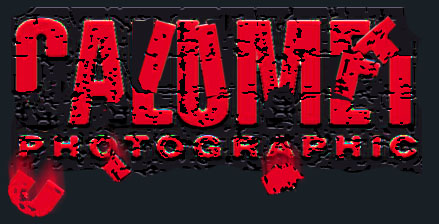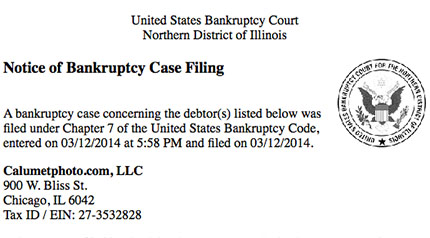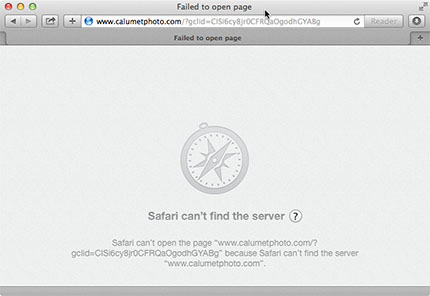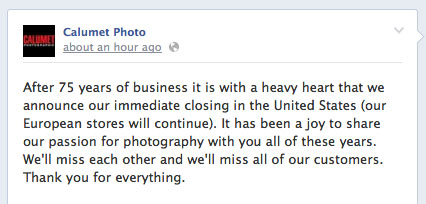CalumetPhoto - Chapter 7 Bankruptcy
 While rumors have been swirling for much of the day on Wednesday, the story about whether or not the storied camera store chain CalumetPhoto has filed for bankruptcy have come true.
While rumors have been swirling for much of the day on Wednesday, the story about whether or not the storied camera store chain CalumetPhoto has filed for bankruptcy have come true.
Calumetphoto.com LLC has voluntarily filed for Chapter 7 bankruptcy, listed as case #14-08908 in the Northern District of Illinois United States Bankruptcy Court. The filing is dated March 12, 2014 and the first meeting is scheduled on April 22, 2014.

CalumetPhoto, in recent months, has been pulling back from their participation in activities they have, in the past, normally sponsored or been involved in, and there have been grumblings amongst store management as well as serious concerns raised by some equipment manufacturing representatives and vendors as well. While many companies file for Chapter 11 bankruptcy in order to reorganize, sources tell Photo Business News that while CalumetPhoto tried this route, ultimately they found themselves in Chapter 7 bankruptcy, which is the phase companies end up in when Chapter 11 does not work, and the company has to liquidate.
CalumetPhoto, founded in 1939 grew to almost 3 dozen stores nationwide, and, in recent years, most notably acquired the Penn Camera camera stores in 2012 in the Washington DC region after they had gone into Chapter 11 bankruptcy. After shedding 5 of the 8 locations, the remaining 3 were intended to continue to fulfill the various government contracts that Penn Camera had acquired over the years, as a hopeful source of ongoing revenue for the beleaguered company.

All CalumetPhoto stores in the United States are closed, and classes have been cancelled and their @calumetphoto twitter account is now non-existent, yet there were posts on their Facebook account up until mid-day Wednesday. The overseas CalumetPhoto stores in the EU remain operational. According to Seng Ng, the Director of Finance for CalumetPhoto U.K., when asked how this will affect the UK store, responded "not at all" continuing "we share the same name but are two distinct entities." Their website remains operational and stores there are open.
Late in the day Wednesday, visitors to the Calumetphoto.com website found it non-operational, as below:

Reports from current and former employees and individual store management have reportedly been detailing the trials and tribulations of their times at CalumetPhoto and the state of the company has reportedly not been well.
The PDF of the court filing can be viewed here, as a PDF.
-------------------
Update: At about 10:30am Eastern time, CalumetPhoto posted this on their Facebook page:

Please post your comments by clicking the link below. If you've got questions, please pose them in our Photo Business Forum Flickr Group Discussion Threads.














